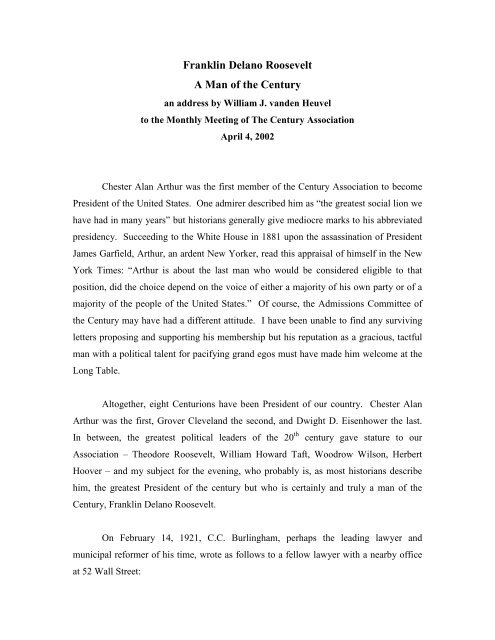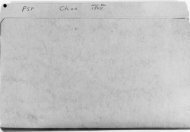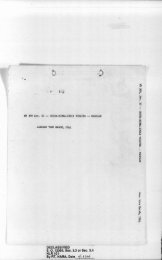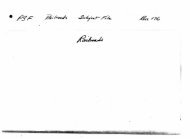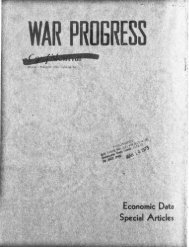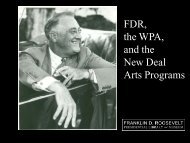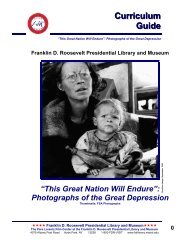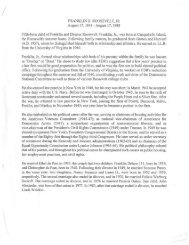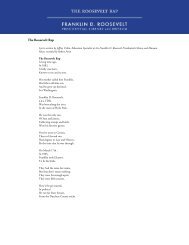Franklin Delano Roosevelt A Man of the Century
Franklin Delano Roosevelt A Man of the Century
Franklin Delano Roosevelt A Man of the Century
You also want an ePaper? Increase the reach of your titles
YUMPU automatically turns print PDFs into web optimized ePapers that Google loves.
<strong>Franklin</strong> <strong>Delano</strong> <strong>Roosevelt</strong><br />
A <strong>Man</strong> <strong>of</strong> <strong>the</strong> <strong>Century</strong><br />
an address by William J. vanden Heuvel<br />
to <strong>the</strong> Monthly Meeting <strong>of</strong> The <strong>Century</strong> Association<br />
April 4, 2002<br />
Chester Alan Arthur was <strong>the</strong> first member <strong>of</strong> <strong>the</strong> <strong>Century</strong> Association to become<br />
President <strong>of</strong> <strong>the</strong> United States. One admirer described him as “<strong>the</strong> greatest social lion we<br />
have had in many years” but historians generally give mediocre marks to his abbreviated<br />
presidency. Succeeding to <strong>the</strong> White House in 1881 upon <strong>the</strong> assassination <strong>of</strong> President<br />
James Garfield, Arthur, an ardent New Yorker, read this appraisal <strong>of</strong> himself in <strong>the</strong> New<br />
York Times: “Arthur is about <strong>the</strong> last man who would be considered eligible to that<br />
position, did <strong>the</strong> choice depend on <strong>the</strong> voice <strong>of</strong> ei<strong>the</strong>r a majority <strong>of</strong> his own party or <strong>of</strong> a<br />
majority <strong>of</strong> <strong>the</strong> people <strong>of</strong> <strong>the</strong> United States.” Of course, <strong>the</strong> Admissions Committee <strong>of</strong><br />
<strong>the</strong> <strong>Century</strong> may have had a different attitude. I have been unable to find any surviving<br />
letters proposing and supporting his membership but his reputation as a gracious, tactful<br />
man with a political talent for pacifying grand egos must have made him welcome at <strong>the</strong><br />
Long Table.<br />
Altoge<strong>the</strong>r, eight Centurions have been President <strong>of</strong> our country. Chester Alan<br />
Arthur was <strong>the</strong> first, Grover Cleveland <strong>the</strong> second, and Dwight D. Eisenhower <strong>the</strong> last.<br />
In between, <strong>the</strong> greatest political leaders <strong>of</strong> <strong>the</strong> 20 th century gave stature to our<br />
Association – Theodore <strong>Roosevelt</strong>, William Howard Taft, Woodrow Wilson, Herbert<br />
Hoover – and my subject for <strong>the</strong> evening, who probably is, as most historians describe<br />
him, <strong>the</strong> greatest President <strong>of</strong> <strong>the</strong> century but who is certainly and truly a man <strong>of</strong> <strong>the</strong><br />
<strong>Century</strong>, <strong>Franklin</strong> <strong>Delano</strong> <strong>Roosevelt</strong>.<br />
On February 14, 1921, C.C. Burlingham, perhaps <strong>the</strong> leading lawyer and<br />
municipal reformer <strong>of</strong> his time, wrote as follows to a fellow lawyer with a nearby <strong>of</strong>fice<br />
at 52 Wall Street:
“My dear <strong>Roosevelt</strong>:<br />
Now that you are back in private life and in a suburb <strong>of</strong> your own<br />
home town, I want you to join <strong>the</strong> <strong>Century</strong>. Tell me who will propose and<br />
who will second you, and I will write <strong>the</strong>m and tell <strong>the</strong>m to do it.<br />
W.C. Brownell, <strong>the</strong> literary critic <strong>of</strong> Scribner’s, was in an elevator<br />
at <strong>the</strong> New York Athletic Club and he heard one man say to ano<strong>the</strong>r:<br />
“Did you ever hear <strong>of</strong> <strong>the</strong> <strong>Century</strong> Club?<br />
“Yes, it’s down in 43 rd Street.<br />
“What sort <strong>of</strong> a club is it?<br />
“It’s a club <strong>of</strong> eminent men.<br />
“Ain’t that a hell <strong>of</strong> a club!”<br />
2<br />
Sincerely yours,<br />
C.C. Burlingham”<br />
The next day, FDR wrote Mr. Burlingham that he accepted <strong>the</strong> invitation to be<br />
proposed as a member <strong>of</strong> <strong>the</strong> Association, writing that he felt “very highly honored… for<br />
in spite <strong>of</strong> <strong>the</strong> remark <strong>of</strong> <strong>the</strong> man in <strong>the</strong> elevator, <strong>the</strong>re is only one <strong>Century</strong> Club in <strong>the</strong><br />
world.” On February 16, Burlingham sent FDR <strong>the</strong> Club book so he could mark those<br />
members he knew well, leaving it <strong>the</strong>n to CCB to ask a proposer and seconder to do <strong>the</strong>ir<br />
duty. Among those FDR marked as known friends were George Blagden, William<br />
Chadbourne, Frederic Coudert, Augustus Hand, Thomas Lamont, George Putnam and<br />
Robert Grier Monroe whom Mr. Burlingham chose as FDR’s proposer. John G. Milburn,<br />
a senior partner <strong>of</strong> <strong>the</strong> law firm where FDR had served his legal apprenticeship [Carter,<br />
Ledyard and Milburn] agreed to be his seconder “because I know him well and am very<br />
fond <strong>of</strong> him.” It was in Milburn’s home in Buffalo, New York that President McKinley<br />
died and Theodore <strong>Roosevelt</strong> had taken <strong>the</strong> oath <strong>of</strong> <strong>of</strong>fice twenty years before.<br />
FDR was certainly familiar with <strong>the</strong> <strong>Century</strong> before he became a member. In<br />
May 1921, for example, he was a guest <strong>of</strong> Edward Bok, <strong>the</strong> creative and business genius<br />
<strong>of</strong> <strong>the</strong> Saturday Evening Post and <strong>the</strong> Curtis Publishing Company – whose grandson,
Derek Bok, later became President <strong>of</strong> Harvard University. Edward Bok, who gloried in<br />
his success having come to <strong>the</strong> United States as a 14 year old immigrant from Holland,<br />
used that meeting at <strong>the</strong> <strong>Century</strong> to found <strong>the</strong> Ne<strong>the</strong>rland-America Foundation with <strong>the</strong><br />
purpose <strong>of</strong> advancing mutual understanding and active exchange between <strong>the</strong> two<br />
countries. Because <strong>the</strong> Ne<strong>the</strong>rlands was neutral in World War I and because Queen<br />
Wilhelmina gave reluctant sanctuary to <strong>the</strong> defeated Kaiser, <strong>the</strong> normally warm and<br />
cordial American feelings for <strong>the</strong> Dutch were under pressure. The <strong>Roosevelt</strong>s – all <strong>of</strong><br />
<strong>the</strong>m—were directly descended from Claes Martenson van Rosevelt who had come in<br />
1648 to New Amsterdam from <strong>the</strong> province <strong>of</strong> Zeeland in <strong>the</strong> Ne<strong>the</strong>rlands. FDR always<br />
took pride in his Dutch forebears. At <strong>the</strong> <strong>Century</strong> meeting, he agreed to be an <strong>of</strong>ficer <strong>of</strong><br />
<strong>the</strong> Foundation.<br />
<strong>Franklin</strong> <strong>Roosevelt</strong> was elected as a Centurion on January 14, 1922 at <strong>the</strong> monthly<br />
meeting <strong>of</strong> <strong>the</strong> Association. Elected at <strong>the</strong> same time as a non-resident member was<br />
Hiram Bingham, <strong>the</strong> Yale pr<strong>of</strong>essor who discovered Machu Picchu, <strong>the</strong> ancient Inca<br />
kingdom in Peru, and served eight years as U.S. Senator from Connecticut.<br />
At this point, FDR was 39 years old. He had been married for 16 years. When<br />
<strong>Franklin</strong> married Eleanor in 1905, <strong>the</strong> President <strong>of</strong> <strong>the</strong> United States – Theodore<br />
<strong>Roosevelt</strong>, gave <strong>the</strong> bride away and dominated <strong>the</strong> event by his presence. There was<br />
probably no one whom FDR admired more than Theodore <strong>Roosevelt</strong>. The extraordinary<br />
parallel <strong>of</strong> <strong>the</strong>ir careers was undoubtedly influenced greatly by that admiration. Those<br />
parallels include <strong>the</strong> following: both TR and FDR, separated by a generation in time,<br />
were elected to <strong>the</strong> New York State legislature (TR at 23, FDR at 28); both were<br />
appointed Assistant Secretary <strong>of</strong> <strong>the</strong> Navy (TR at 39, FDR at 31); both were Vice<br />
Presidential candidates (TR at 41, FDR at 38); both knew political defeat, TR as a<br />
candidate for Mayor <strong>of</strong> New York (1886) and in his Bull Moose campaign for President<br />
(1912), FDR in <strong>the</strong> Democratic primary campaign for <strong>the</strong> United States Senate (1914)<br />
and as <strong>the</strong> running mate <strong>of</strong> James Cox in <strong>the</strong> 1920 presidential election; both married at a<br />
young age, TR at 22, FDR at 23, and both had four sons as brave participants in <strong>the</strong> two<br />
3
world wars. Both were Harvard graduates and, most significantly, both were members <strong>of</strong><br />
<strong>the</strong> <strong>Century</strong> Association.<br />
On September 7, 1923, FDR as a new Centurion agreed to write a letter in support<br />
<strong>of</strong> <strong>the</strong> nomination <strong>of</strong> Minot Simons, <strong>the</strong> pastor <strong>of</strong> All Souls Unitarian Church, <strong>the</strong> church<br />
where FDR’s parents were married in 1880. But <strong>the</strong>n, on December 15, 1923, <strong>Franklin</strong><br />
<strong>Roosevelt</strong> writes <strong>the</strong> Board <strong>of</strong> <strong>the</strong> <strong>Century</strong> an abrupt and clearly painful letter. He feels<br />
obliged to resign. “I am doing this only because I am spending most <strong>of</strong> my time in <strong>the</strong><br />
country at present and feel that I cannot avail myself <strong>of</strong> <strong>the</strong> privileges <strong>of</strong> <strong>the</strong> Association<br />
for some time to come.” FDR’s life had been transformed by debilitating illness.<br />
In August 1921, at <strong>the</strong> age <strong>of</strong> 39, <strong>Franklin</strong> <strong>Roosevelt</strong> had been stricken by<br />
infantile paralysis. It was an ordeal that many believe gave him <strong>the</strong> courage and<br />
character to become a great president but <strong>the</strong> path to recovery was a tortured one with<br />
many crises <strong>of</strong> despair and anguish. He suffered acute pain for many weeks. There was<br />
considerable question whe<strong>the</strong>r he would ever be able to sit up again. In 1923 he chartered<br />
a houseboat and spent weeks cruising in Florida, swimming in <strong>the</strong> warm water that<br />
relieved pain and gave him hope for his weakened legs. The expenses and <strong>the</strong> strain <strong>of</strong><br />
<strong>the</strong> extended convalescence mounted. He was confident that he could learn to walk<br />
again. It became <strong>the</strong> focus <strong>of</strong> his life. His forays into public places were carefully<br />
planned. The magnificent deception had begun that kept his significant disability a<br />
personal, private matter. Two-thirds <strong>of</strong> his personal fortune went into establishing <strong>the</strong><br />
Warm Springs Foundation in Georgia. He transformed it into a major treatment center<br />
for polio victims. He created an enterprise that is today one <strong>of</strong> <strong>the</strong> most successful<br />
rehabilitation centers in <strong>the</strong> country.<br />
In 1924, Governor Alfred E. Smith asked FDR to nominate him for president at<br />
<strong>the</strong> Democratic national convention in New York City. On <strong>the</strong> arm <strong>of</strong> his son FDR, with<br />
his legs firm in locked braces, holding a cane in his o<strong>the</strong>r hand, advanced slowly without<br />
crutches to <strong>the</strong> podium in Madison Square Garden. It was a moment that no one who saw<br />
it would ever forget. His palpable courage, his lyrical eloquence, his magnificent voice,<br />
4
ought <strong>the</strong> delegates to <strong>the</strong>ir feet – and at that moment <strong>Franklin</strong> <strong>Roosevelt</strong> resumed a<br />
national political career. Seven years after his polio attack <strong>Roosevelt</strong> was elected<br />
Governor <strong>of</strong> New York. As Frank Freidel, one <strong>of</strong> <strong>the</strong> important <strong>Roosevelt</strong> biographers<br />
has written, <strong>Roosevelt</strong> had perfected so effective an illusion <strong>of</strong> his strength and wellbeing<br />
that most Americans never realized until after his death that he was, in fact, a paraplegic.<br />
On December 17, 1923, in response to FDR’s letter <strong>of</strong> resignation, <strong>the</strong> Secretary<br />
<strong>of</strong> <strong>the</strong> <strong>Century</strong>, A.D. Noyes, wrote him a personal note expressing <strong>the</strong> hope that he would<br />
reconsider his action. He obviously did reconsider because on June 5, 1924, with Elihu<br />
Root, Theodore <strong>Roosevelt</strong>’s Secretary <strong>of</strong> War and Secretary <strong>of</strong> State, presiding, <strong>the</strong><br />
Board <strong>of</strong> <strong>Man</strong>agement passed <strong>the</strong> motion acceding to <strong>Franklin</strong> <strong>Roosevelt</strong>’s request “for<br />
transfer from <strong>the</strong> resident to <strong>the</strong> non-resident list…” And so <strong>the</strong> squire <strong>of</strong> Hyde Park, <strong>the</strong><br />
farmer from Dutchess County, and, <strong>of</strong> course, <strong>the</strong> future Governor <strong>of</strong> <strong>the</strong> State <strong>of</strong> New<br />
York and President <strong>of</strong> <strong>the</strong> United States, <strong>Franklin</strong> <strong>Roosevelt</strong> continued as a non-resident<br />
member <strong>of</strong> <strong>the</strong> <strong>Century</strong> Association.<br />
Before <strong>the</strong> Board <strong>of</strong> <strong>Man</strong>agement had acted, FDR had been asked to write a<br />
supporting letter for <strong>the</strong> candidacy <strong>of</strong> George Martin who had been nominated by Mr.<br />
Burlingham. In a reply, written from his houseboat in Florida on March 17, 1924, FDR<br />
indicated that he had resigned from <strong>the</strong> Club and <strong>the</strong>refore should not and could not write<br />
such a letter. Once he was secure in his status as a non-resident member, however, and<br />
especially when he became Governor <strong>of</strong> New York in 1929, FDR was frequently asked to<br />
write letters supporting proposed candidates. A gentleman named H. Morton Merriman,<br />
a neighbor <strong>of</strong> FDR’s on Campobello Island, was such a candidate. Archibald Douglas<br />
wrote FDR asking for <strong>the</strong> supporting letter saying that “I know that such a letter will go<br />
very far toward insuring Mr. Merriman’s election.” For unstated reasons Merriman’s<br />
name was held up by <strong>the</strong> Admissions Committee. Governor <strong>Roosevelt</strong> had written a<br />
letter in his support but it was a pro forma letter, still unconvincing as one reads it <strong>the</strong>se<br />
many years later. Archibald Douglas asked him to write again for fear that Merriman<br />
would be passed over. <strong>Roosevelt</strong> did write a more extensive letter, leaving out his earlier<br />
point that Mr. Merriman was head <strong>of</strong> an important silk company, concentrating instead<br />
5
on his interest in African exploration, his extensive knowledge <strong>of</strong> public affairs, and his<br />
voluntary work as Secretary <strong>of</strong> <strong>the</strong> Memorial Cancer Hospital. Mr. Merriman was<br />
elected a member in 1931. On April 5, 1929, supporting <strong>the</strong> candidacy that had been<br />
seconded by Colonel Edward House, Woodrow Wilson’s confidant, <strong>of</strong> Judge Robert<br />
Worth Bingham <strong>of</strong> Louisville, Kentucky, FDR wrote that <strong>the</strong> Judge was an old friend <strong>of</strong><br />
his and “I should be very glad to see him elected to <strong>the</strong> <strong>Century</strong> Association.” After his<br />
election to <strong>the</strong> presidency, Judge Bingham was FDR’s choice to be Ambassador to <strong>the</strong><br />
Court <strong>of</strong> St. James and, <strong>of</strong> course, his newspapers and <strong>the</strong> Bingham family became<br />
synonymous with great journalism. Poultney Bigelow wrote <strong>the</strong> newly elected Governor<br />
asking him to support <strong>the</strong> nomination <strong>of</strong> Dr. F.F. Day, <strong>the</strong> newly appointed president <strong>of</strong><br />
Union College, citing <strong>the</strong> fact that FDR’s fa<strong>the</strong>r had graduated from Union College in<br />
1847 as a reason that might cause him to show sentimental interest. As a postscript to a<br />
second letter to <strong>the</strong> Governor asking if he had written, Mr. Bigelow passed on some<br />
gossip which must have indicated that FDR had an interest in <strong>the</strong> subject to <strong>the</strong> effect that<br />
Prince Louis Ferdinand, <strong>the</strong> grandson <strong>of</strong> <strong>the</strong> Kaiser, was working for Henry Ford and that<br />
he was not engaged to anyone – “least <strong>of</strong> all to a movie star” and that <strong>the</strong> Prince’s<br />
grandfa<strong>the</strong>r, Kaiser Wilhelm II, had cabled Mr. Bigelow to like effect. O<strong>the</strong>r letters <strong>of</strong><br />
support were written by Governor <strong>Roosevelt</strong> for Francis B. Riggs, who had been<br />
proposed by Dr. Endicott Peabody who reminded FDR that Mr. Riggs was a graduate <strong>of</strong><br />
Groton. He supported Maunsell Crosby, an amateur ornithologist who was a Dutchess<br />
County neighbor. In June 1932 he wrote on behalf <strong>of</strong> Pr<strong>of</strong>essor Robert M. Hague <strong>of</strong><br />
Barnard College. Mr. Copley Amory, Jr. to whom FDR referred to as his cousin was also<br />
<strong>the</strong> beneficiary <strong>of</strong> a supporting letter that year from <strong>the</strong> Governor.<br />
<strong>Franklin</strong> <strong>Roosevelt</strong> was inaugurated for <strong>the</strong> first <strong>of</strong> his four terms as President on<br />
March 4, 1933. Whe<strong>the</strong>r it was <strong>the</strong> careful filing system <strong>of</strong> his devoted secretaries, Missy<br />
LeHand and Grace Tully, or his own predilection as a collector to save what o<strong>the</strong>rs might<br />
find valueless, <strong>the</strong>re are a considerable number <strong>of</strong> notices from <strong>the</strong> <strong>Century</strong> Association<br />
that are part <strong>of</strong> <strong>the</strong> records kept at <strong>the</strong> Presidential Library at Hyde Park. A fascinating<br />
pr<strong>of</strong>ile <strong>of</strong> our cherished <strong>Century</strong> Club emerges from <strong>the</strong>se documents. For example, in a<br />
notice <strong>of</strong> <strong>the</strong> monthly meeting for November 1, 1934, it is reported that 142 breakfasts<br />
6
were served in September. When we combine that information with a Club notice <strong>of</strong><br />
April 28, 1936, we have echoes <strong>of</strong> a contemporary debate. The notice <strong>of</strong> that date told<br />
members that <strong>the</strong> Columbia University Club had extended room privileges to all<br />
members <strong>of</strong> <strong>the</strong> <strong>Century</strong>. The Columbia University Club was across <strong>the</strong> street, now a<br />
Moonie dormitory and hotel. Let <strong>the</strong> Board <strong>of</strong> <strong>Man</strong>agers take note. Rooms with bath<br />
were available at $3.00 a day or $60.00 monthly. Suites were more expensive – $5 a day<br />
or $100 a month. But single rooms could be obtained, presumably without baths, for $2 a<br />
day or $36 a month.<br />
There was an exhibit <strong>of</strong> Italian paintings <strong>of</strong> <strong>the</strong> Renaissance, including works by<br />
Piero della Francesco, Botticelli and Bartolommeo in March 1935. There are notices <strong>of</strong><br />
memorable names being elected to membership such as Tom Finletter in 1934, George<br />
Wharton Pepper in 1936, as well as Archibald MacLeish, Lord Lothian (later British<br />
Ambassador to <strong>the</strong> United States) and Lewis Douglas (later Harry Truman’s Ambassador<br />
to Great Britain). The Club celebrated <strong>the</strong> 75 th birthday anniversary <strong>of</strong> Dr. Walter<br />
Damrosch in 1937 and in that same year had a memorial service for Elihu Root who had<br />
been a member for 51 years and president <strong>of</strong> <strong>the</strong> <strong>Century</strong> for nine <strong>of</strong> those years. Nelson<br />
Rockefeller was elected in May 1937. Also in that year Dean Acheson, Alan Dulles and<br />
Arthur Hays Sulzberger were made members – Mr. Sulzberger having been nominated by<br />
Admiral Richard Byrd and seconded by <strong>the</strong> sitting Chief Justice <strong>of</strong> <strong>the</strong> United States,<br />
Charles Evans Hughes.<br />
In 1938 a reception was given to honor Mr. Justice van Devanter, a recently<br />
retired member <strong>of</strong> <strong>the</strong> Supreme Court <strong>of</strong> <strong>the</strong> United States. Honoring Justice van<br />
Devanter was undoubtedly a means <strong>of</strong> showing <strong>the</strong> disdain <strong>of</strong> many Centurions,<br />
including Charles Burlingham, for President <strong>Roosevelt</strong>’s Supreme Court reform<br />
proposals. There is reason to believe that <strong>the</strong> prevailing sentiment <strong>of</strong> <strong>the</strong> <strong>Century</strong> Club<br />
did not favor <strong>the</strong> New Deal. On June 8, 1938, Bice Clemow, a Centurion with admiration<br />
for <strong>the</strong> President, wrote him a letter which included this refreshing insight: “Yesterday in<br />
<strong>the</strong> <strong>Century</strong> Club I eavesdropped on two greybeards who were gleefully, but you can bet<br />
damn furtively, reassuring <strong>the</strong>mselves that “<strong>Roosevelt</strong>’s got ‘em on <strong>the</strong> run now” and<br />
7
exchanging pleasure over your chin-up spirit and continued excellent health.” Mr.<br />
Clemow’s letter continues: “The circumspect <strong>Century</strong> trembled, I’m almost certain, down<br />
to <strong>the</strong> frayed magnifying glass which hangs from <strong>the</strong> telephone book. There must be<br />
black sheep in even <strong>the</strong> most august, woolly flock.” <strong>Roosevelt</strong> delighted at <strong>the</strong> report.<br />
In <strong>the</strong> most controversial legislation <strong>of</strong> his presidency, FDR proposed that when a<br />
federal judge, including those on <strong>the</strong> Supreme Court, reached <strong>the</strong> age <strong>of</strong> 70 and chose not<br />
to retire, that <strong>the</strong> President could add a new Justice to <strong>the</strong> Bench. By <strong>the</strong> winter <strong>of</strong> 1935,<br />
<strong>the</strong> Supreme Court had become <strong>the</strong> last hope <strong>of</strong> those who were committed to blocking<br />
<strong>the</strong> New Deal. FDR’s concept <strong>of</strong> <strong>the</strong> constitutional powers <strong>of</strong> <strong>the</strong> President and <strong>the</strong><br />
Congress to cope with <strong>the</strong> Great Depression was much closer to Theodore <strong>Roosevelt</strong>’s<br />
but very different from that <strong>of</strong> FDR’s Republican predecessors who had appointed <strong>the</strong><br />
dominant majority <strong>of</strong> <strong>the</strong> Supreme Court. The anti-New Deal forces literally started<br />
thousands <strong>of</strong> legal actions to stop <strong>the</strong> fulfillment <strong>of</strong> programs which <strong>the</strong> President had<br />
initiated, that Congress had legislated, and <strong>the</strong> people in landslide elections had approved.<br />
The Court invalidated <strong>the</strong> Railroad Retirement Act. It <strong>the</strong>n overturned <strong>the</strong> National<br />
Recovery Act as well as <strong>the</strong> Mortgage Moratorium legislation. In 1936 it ruled <strong>the</strong><br />
Agricultural Adjustment Act unconstitutional. Harlan Fiske Stone, appointed by Calvin<br />
Coolidge, wrote a dissent accusing his colleagues <strong>of</strong> deciding on <strong>the</strong> basis <strong>of</strong> <strong>the</strong>ir own<br />
economic <strong>the</strong>ories ra<strong>the</strong>r than fair constitutional interpretation. The Court proceeded to<br />
overturn legislation designed to bring order and safety to <strong>the</strong> desperate coal mining<br />
industry; it overturned <strong>the</strong> Municipal Bankruptcy Act created to save local governments<br />
across <strong>the</strong> country in financial distress; and <strong>the</strong>n it ruled unconstitutional <strong>the</strong> New York<br />
State law establishing minimum wages, outlawing child labor and regulating <strong>the</strong> hours<br />
and labor conditions affecting women. Even <strong>the</strong> opponents <strong>of</strong> <strong>the</strong> New Deal were<br />
embarrassed.<br />
FDR awaited <strong>the</strong> election returns <strong>of</strong> 1936 before acting. He was re-elected in an<br />
overwhelming landslide. The Court was about <strong>the</strong> decide <strong>the</strong> constitutionality <strong>of</strong> <strong>the</strong><br />
Social Security Act and <strong>the</strong> Wagner Act establishing collective bargaining and protecting<br />
<strong>the</strong> right <strong>of</strong> labor to organize, and <strong>the</strong> minimum age and employment laws. It was a<br />
8
dramatic moment in our history. Would <strong>the</strong> economic and social revolution enacted by<br />
<strong>the</strong> elected representatives <strong>of</strong> <strong>the</strong> people be defeated – not at <strong>the</strong> polls but by a Court<br />
whose majority philosophy <strong>the</strong> people had decisively repudiated? Would it now return<br />
<strong>the</strong> demand for change to <strong>the</strong> anarchy and violence <strong>of</strong> <strong>the</strong> streets? The<br />
conservative/radical justices who dominated <strong>the</strong> Court, though aged and in declining<br />
health, were determined to stay in <strong>of</strong>fice as long as <strong>Roosevelt</strong> was President in order to<br />
frustrate his programs. President <strong>Roosevelt</strong> took comfort in reading <strong>the</strong>se words from<br />
Abraham Lincoln’s first inaugural:<br />
The candid citizen must confess that if <strong>the</strong> policy <strong>of</strong> <strong>the</strong> government upon<br />
vital questions affecting <strong>the</strong> whole people is to be irrevocably fixed by<br />
decisions <strong>of</strong> <strong>the</strong> Supreme Court, <strong>the</strong> people will have ceased to be <strong>the</strong>ir<br />
own rulers, having to that extent practically resigned <strong>the</strong>ir government into<br />
<strong>the</strong> hands <strong>of</strong> that eminent tribunal…<br />
<strong>Roosevelt</strong> had enormous respect for <strong>the</strong> constitutional framework <strong>of</strong> <strong>the</strong> balance<br />
<strong>of</strong> power and for <strong>the</strong> integrity <strong>of</strong> <strong>the</strong> Supreme Court as an independent branch <strong>of</strong> our<br />
government. But he stood with Lincoln in rejecting <strong>the</strong> concept that <strong>the</strong> Constitution was<br />
a rigid, inflexible instrument that could prevent <strong>the</strong> government from responding to crises<br />
that threatened to destroy <strong>the</strong> nation. FDR presented his reorganization proposal to<br />
Congress on February 5, 1937. Within weeks, under pressure from Chief Justice Hughes,<br />
ano<strong>the</strong>r Centurion, <strong>the</strong> Court reversed its course, upholding <strong>the</strong> Wagner Act and <strong>the</strong><br />
Social Security legislation and even <strong>the</strong> State Minimum Wage laws it had ruled<br />
unconstitutional just months before. Most <strong>of</strong> <strong>the</strong> reorganization proposals were adopted<br />
by <strong>the</strong> Congress including <strong>the</strong> provision that obliges federal judges, o<strong>the</strong>r than those on<br />
<strong>the</strong> Supreme Court, to take senior status at <strong>the</strong> age <strong>of</strong> 70 so that <strong>the</strong> President can appoint<br />
new justices to <strong>the</strong> bench on which <strong>the</strong>y serve. Wendell Willkie, elected to <strong>the</strong> <strong>Century</strong><br />
on December 5, 1936, having been nominated by John W. Davis, wrote: “Mr. <strong>Roosevelt</strong><br />
has won. The Court is now his… Mr. <strong>Roosevelt</strong> has accomplished exactly what he<br />
would have accomplished if Congress had approved his proposal…”<br />
9
As World War II approached, <strong>the</strong> <strong>Century</strong> Association reflected <strong>the</strong> pr<strong>of</strong>ound<br />
division between those who believed that America’s national security and its values as a<br />
nation required it to support <strong>the</strong> democracies in <strong>the</strong> battle against <strong>the</strong> totalitarian forces<br />
besieging <strong>the</strong> world and those who were part <strong>of</strong> <strong>the</strong> America First movement who<br />
devoutly believed that involvement in European wars could only endanger democracy in<br />
America itself.<br />
As <strong>the</strong> Nazi conquest <strong>of</strong> France in June 1940 shook <strong>the</strong> world, FDR decided to<br />
run for a third term. Now his opponent was ano<strong>the</strong>r Centurion, Wendell Willkie. In<br />
1912, three Centurions ran against each o<strong>the</strong>r for <strong>the</strong> presidency (Theodore <strong>Roosevelt</strong>,<br />
Taft, Wilson), and in 1932 FDR had run against Centurion Herbert Hoover. Political<br />
balances were shattered when still ano<strong>the</strong>r Centurion, Henry Stimson, Secretary <strong>of</strong> State<br />
under Herbert Hoover, accepted FDR’s <strong>of</strong>fer to be Secretary <strong>of</strong> War. But partisan<br />
politics were set aside as Centurions with strong beliefs about our international<br />
obligations determined how best to influence <strong>the</strong> course <strong>of</strong> action being determined by<br />
<strong>the</strong>ir non-resident colleague and present Commander-in-Chief. A memorandum by<br />
Bethuel Webster is in our archives detailing luncheon meetings at <strong>the</strong> <strong>Century</strong> beginning<br />
in May 1940 which resulted in <strong>the</strong> organization <strong>of</strong> <strong>the</strong> Office <strong>of</strong> Scientific Research and<br />
Development led by Centurions Vannevar Bush and James Conant, <strong>the</strong>n president <strong>of</strong><br />
Harvard University. Centurion Robert Sherwood has written <strong>of</strong> frequent meetings at <strong>the</strong><br />
<strong>Century</strong> in <strong>the</strong> summer <strong>of</strong> 1940 with a group that became known as <strong>the</strong> Fight For<br />
Freedom Committee which advocated interventionist policies. The Committee to Defend<br />
America by aiding <strong>the</strong> Allies had a strong Centurion identification, beginning with its<br />
chairman, William Allen White, a non-resident member who was editor <strong>of</strong> <strong>the</strong> Emporia<br />
Gazette <strong>of</strong> Kansas. Our beloved colleague, Arthur Schlesinger, Jr., has described <strong>the</strong>se<br />
momentous days in a cogent, eloquent address now in <strong>the</strong> <strong>Century</strong> archives.<br />
Francis Pickens Miller, a noted Virginian and Centurion, writes in his memoir ∗<br />
that his association with <strong>the</strong> <strong>Century</strong> Group in 1940 gave him a chance to do what was<br />
∗ <strong>Man</strong> From <strong>the</strong> Valley, Memoirs <strong>of</strong> a 20 th <strong>Century</strong> Virginian, Francis Pickens Miller, University <strong>of</strong> North<br />
Carolina Press (1971) Pages 90 et seq.<br />
10
probably <strong>the</strong> most useful work that he had ever done, in addition to having made possible<br />
<strong>the</strong> most satisfying experience in his life. He describes <strong>the</strong> events <strong>of</strong> that fateful summer<br />
and what it meant to be an American and have some part in turning <strong>the</strong> tide against<br />
tyranny. Mr. Miller’s role along with Lewis Douglas, Herbert Agar, Dr. Henry Sloane<br />
C<strong>of</strong>fin, Whitney Shepardson, and Henry van Dusen and o<strong>the</strong>rs was to affect <strong>the</strong> political<br />
climate that enabled President <strong>Roosevelt</strong> to carry out <strong>the</strong> desperately needed transaction<br />
which gave <strong>the</strong> British fifty over-aged destroyers in return for long-term leases on<br />
military bases in <strong>the</strong> western hemisphere. Some <strong>of</strong> <strong>the</strong>se Centurions were for <strong>the</strong>ir<br />
colleague Wendell Willkie. Some were for FDR. But <strong>the</strong>y were all deeply conscious <strong>of</strong><br />
<strong>the</strong> fact that <strong>the</strong>re were national and international interests that transcended <strong>the</strong> partisan<br />
interests <strong>of</strong> <strong>the</strong> day. FDR was, <strong>of</strong> course, a consummate political leader. In one situation,<br />
a group came to him urging specific actions in support <strong>of</strong> a cause in which <strong>the</strong>y deeply<br />
believed. He replied: I agree with you, I want to do it, now make me do it. He<br />
understood that a President does not rule by fiat and unilateral commands to a nation. He<br />
must build <strong>the</strong> political support that makes his decisions acceptable to our countrymen.<br />
He read <strong>the</strong> public opinion polls not to define who he was but to determine where <strong>the</strong><br />
country was – and <strong>the</strong>n to strategize how he could move <strong>the</strong> country to <strong>the</strong> objectives he<br />
thought had to be carried out. The summer <strong>of</strong> 1940 was a presidential campaign. The<br />
President needed <strong>the</strong> support <strong>of</strong> Republicans and Democrats before he could carry out <strong>the</strong><br />
destroyer transaction. He needed also to be assured that Wendell Willkie would not use it<br />
as a political issue against him. The <strong>Century</strong> Group decided that <strong>the</strong> most effective<br />
spokesman for <strong>the</strong>ir point <strong>of</strong> view would be General John J. Pershing, <strong>the</strong> revered<br />
commander <strong>of</strong> <strong>the</strong> American Expeditionary Forces in Europe in World War I. Reaching<br />
<strong>the</strong> aged General and <strong>the</strong>n convincing him to make a radio address to <strong>the</strong> nation was a<br />
challenge with hair-raising episodes and frequently bizarre circumstances. But <strong>the</strong><br />
Centurions succeeded and on August 4, 1940 General Pershing made a national broadcast<br />
(written by ano<strong>the</strong>r Centurion, Walter Lippman) supporting <strong>the</strong> destroyer transfer to<br />
Great Britain. That speech was regarded as a turning point in <strong>the</strong> effort to create <strong>the</strong><br />
public support for <strong>the</strong> President. It was followed by radio broadcasts from o<strong>the</strong>r<br />
members <strong>of</strong> <strong>the</strong> <strong>Century</strong> Group which included Admiral Standley, Colonel “Wild” Bill<br />
Donovan, and Robert Sherwood.<br />
11
The all-important question <strong>of</strong> <strong>the</strong> constitutional powers <strong>of</strong> <strong>the</strong> President to carry<br />
out <strong>the</strong> transaction had to be answered. A brilliant memorandum was prepared by FDR’s<br />
assistant, Ben Cohen, who asked several <strong>of</strong> <strong>the</strong> country’s most eminent, respected<br />
lawyers to examine it as a basis <strong>of</strong> a letter for <strong>the</strong> New York Times. The letter, a decisive<br />
intervention in <strong>the</strong> public debate, was published in <strong>the</strong> New York Times on August 11,<br />
1940 and signed by four Centurions: Dean Acheson, Charles Burlingham, Thomas<br />
Thacher and George Rublee. One final step had to be taken. There had to be an<br />
assurance from Wendell Willkie that he would not attack President <strong>Roosevelt</strong> for<br />
carrying out <strong>the</strong> destroyer transaction. The political stakes were very high. The<br />
Republicans could have energized <strong>the</strong> isolationist voters who were already discouraged<br />
by Willkie’s internationalism. The chairman <strong>of</strong> <strong>the</strong> <strong>Century</strong> Group, Lewis Douglas, was<br />
one <strong>of</strong> Willkie’s most ardent supporters and trusted advisers. A telephone call was<br />
arranged between Centurion Archibald MacLeish and Russell Davenport <strong>of</strong> Fortune<br />
Magazine, a leader <strong>of</strong> Willkie’s campaign. Davenport gave <strong>the</strong> needed assurance from<br />
Willkie. President <strong>Roosevelt</strong> announced <strong>the</strong> destroyer transaction on September 3. It<br />
was an historic moment, publicly turning <strong>the</strong> tide in <strong>the</strong> United States from isolationism<br />
to active participation in <strong>the</strong> struggle by democracies against <strong>the</strong> forces <strong>of</strong> tyranny.<br />
Sherwood’s Fight for Freedom Committee continued <strong>the</strong> effort by supporting <strong>the</strong> Lend<br />
Lease legislation which <strong>the</strong> Congress passed in <strong>the</strong> following March.<br />
In 1940 – with Europe under Hitler’s boot – U.S. military strength ranked as 17 th<br />
in <strong>the</strong> world – behind Portugal. Isolationist sentiment remained powerful and was fully<br />
reflected in <strong>the</strong> Congress. The destroyer deal helped save Britain’s lifeline from <strong>the</strong><br />
unremitting attacks <strong>of</strong> German submarines. Hitler called it a belligerent act. It was.<br />
President <strong>Roosevelt</strong> proposed Lend Lease. He announced <strong>the</strong> Four Freedoms as <strong>the</strong> goal<br />
that would justify <strong>the</strong> terrible sacrifices that lay ahead. He met with Winston Churchill.<br />
They announced <strong>the</strong> Atlantic Charter, <strong>the</strong> blueprint for <strong>the</strong> survival <strong>of</strong> democracy, and<br />
toge<strong>the</strong>r <strong>the</strong>y created <strong>the</strong> partnership that we hail today as <strong>the</strong> most important alliance <strong>of</strong><br />
<strong>the</strong> troubled 20 th century. All this – and America was not yet at war, but America’s<br />
isolationists could no longer prevail. FDR’s third term victory decided <strong>the</strong> direction <strong>of</strong><br />
12
<strong>the</strong> nation. On March 28, 1941, less than five months after <strong>the</strong> election, FDR’s noble and<br />
notable opponent, Wendell Willkie, spoke at a meeting at <strong>the</strong> <strong>Century</strong> Club. A Centurion<br />
friend (Bice Clemow) wrote President <strong>Roosevelt</strong> describing <strong>the</strong> Willkie speech as “one <strong>of</strong><br />
<strong>the</strong> most unusual occasions in all <strong>the</strong> annals <strong>of</strong> <strong>the</strong> <strong>Century</strong>.” Wendell Willkie’s plea for<br />
a common front behind <strong>the</strong> President’s foreign policy brought ringing applause from his<br />
audience. Willkie told his fellow Centurions that he was doing everything he could to<br />
help build strong public sentiment behind <strong>the</strong> country’s foreign policy so that <strong>the</strong> man<br />
who beat him for <strong>the</strong> presidency “would become <strong>the</strong> most famous occupant <strong>of</strong> <strong>the</strong> <strong>of</strong>fice<br />
from George Washington on.” The packed library trembled with cheers and applause.<br />
Willkie became FDR’s emissary to Winston Churchill. He toured <strong>the</strong> globe and wrote his<br />
immensely successful book, One World. But for his untimely death on October 1944,<br />
Wendell Willkie may well have worked out a political partnership with <strong>Franklin</strong><br />
<strong>Roosevelt</strong> that would have realigned <strong>the</strong> political forces <strong>of</strong> <strong>the</strong> country in a way that<br />
would have given a solid, continuing base to <strong>the</strong> internationalist liberal values that both<br />
men advocated.<br />
<strong>Franklin</strong> <strong>Roosevelt</strong>’s last known communication with <strong>the</strong> <strong>Century</strong> Club was on<br />
June 10, 1944. Herbert Houston had asked him to write a supporting letter for Edward<br />
Stettinius, <strong>the</strong>n Undersecretary <strong>of</strong> State. <strong>Roosevelt</strong> instead chose to ask Mr. Houston to<br />
transmit a message for him to <strong>the</strong> Committee on Admissions that Stettinius was a good<br />
man who would add greatly to <strong>the</strong> values that <strong>the</strong> <strong>Century</strong> Association cherished.<br />
Eric Larrabee, while president <strong>of</strong> <strong>the</strong> <strong>Century</strong> Association, wrote a majestic book<br />
about <strong>Franklin</strong> <strong>Roosevelt</strong> entitled Commander-in-Chief. *<br />
In it he tells <strong>the</strong> story <strong>of</strong><br />
<strong>Roosevelt</strong> and Churchill being toge<strong>the</strong>r for <strong>the</strong> Casablanca Conference in January 1943.<br />
As <strong>the</strong> conference ended, Churchill persuaded <strong>Roosevelt</strong> to go with him to Marrakech “to<br />
watch <strong>the</strong> sun go down on <strong>the</strong> Atlas Mountains,” a favorite sight <strong>of</strong> Churchill’s. Finally<br />
<strong>the</strong> time came for <strong>Roosevelt</strong>’s departure from Marrakech. At 7:30 in <strong>the</strong> morning, a<br />
ghastly time for <strong>the</strong> Prime Minister, he came to <strong>the</strong> airfield wearing his black velvet<br />
slippers, his blue flannel coverall, and his dressing gown, topped <strong>of</strong>f by <strong>the</strong> hat <strong>of</strong> a Field<br />
* Houghton Mifflin (1987)<br />
13
Marshal <strong>of</strong> <strong>the</strong> Royal Airforce. Churchill said goodbye to <strong>Roosevelt</strong> and <strong>the</strong>n turned to<br />
Kenneth Pendar, <strong>the</strong> American Vice Consul, and said: “Come Pendar, let’s go home. I<br />
don’t like to see <strong>the</strong>m take <strong>of</strong>f.” The sun was breaking through <strong>the</strong> ground mist and <strong>the</strong><br />
outline <strong>of</strong> <strong>the</strong> mountains was beginning to appear. Eric Larrabee writes that <strong>the</strong> aircraft,<br />
though large by <strong>the</strong> standards <strong>of</strong> <strong>the</strong> time, must have seemed tiny in all that vastness. In<br />
<strong>the</strong> car Churchill put his hand on Pendar’s arm. “If anything happened to that man,” he<br />
said, “I couldn’t stand it. He is <strong>the</strong> truest friend; he has <strong>the</strong> far<strong>the</strong>st vision; he is <strong>the</strong><br />
greatest man I have ever known.”<br />
How proud we can be that <strong>Franklin</strong> <strong>Delano</strong> <strong>Roosevelt</strong> was a man <strong>of</strong> <strong>the</strong> <strong>Century</strong>.<br />
14


